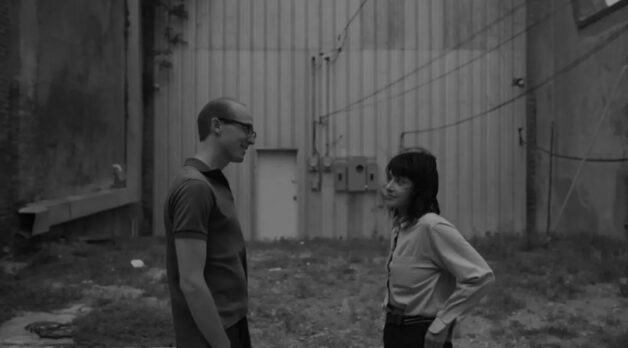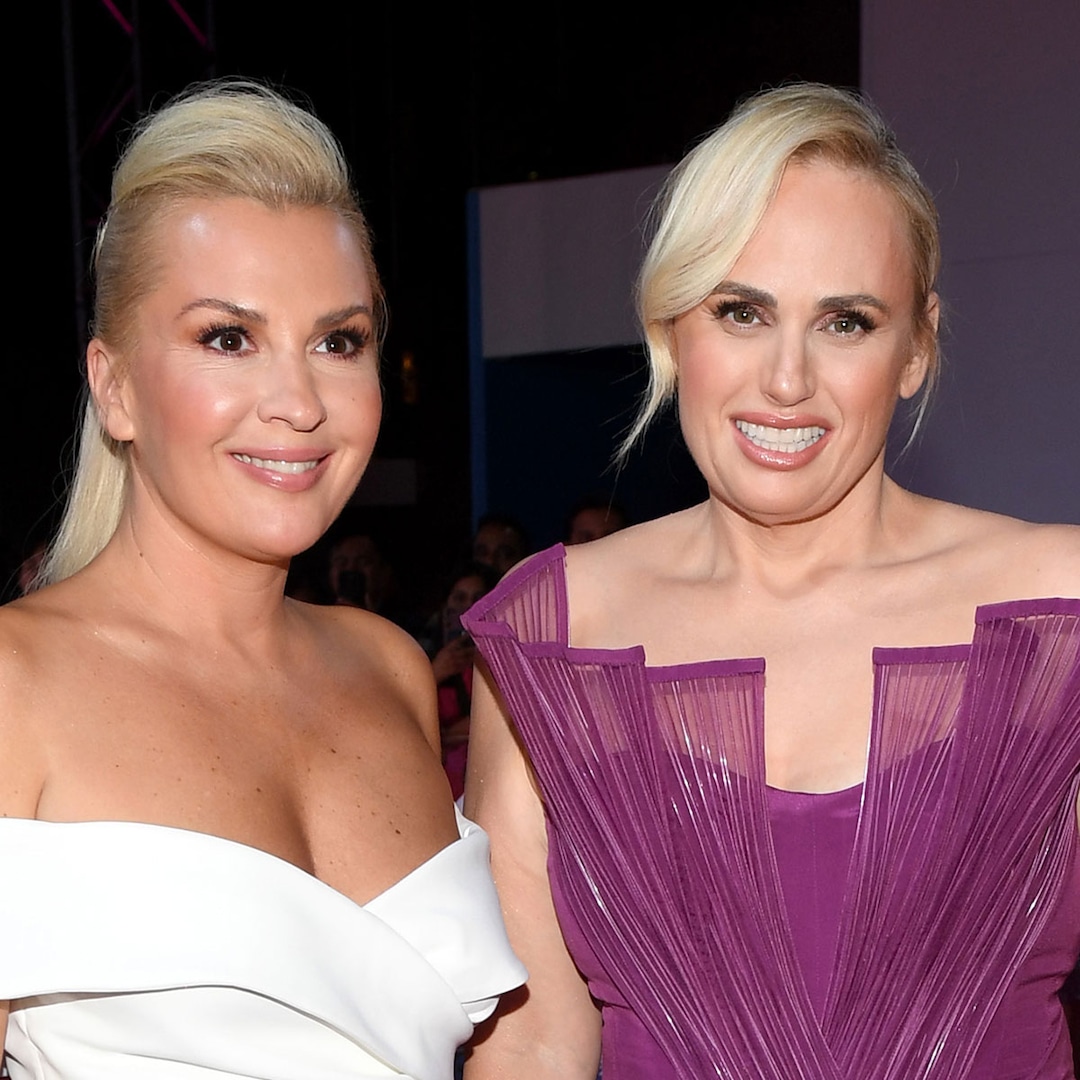
“I’m Constantly Creating Things and Questioning If the World Even Needs More Movies”: Pete Ohs on His Slamdance-Premiering Love and Work
Jan 25, 2024
Love and Work
Pete Ohs, a 2013 Filmmaker 25 New Face, describes his Slamdance-premiering comedy/drama Love and Work as “a film about an imaginary past as a way to figure out where we went wrong in the present.” A minimalist, slightly absurdist romantic comedy, the picture represents both a continuation of the pared-down production model Ohs described to Filmmaker upon the release of his previous Jethica as well as a dramatic departure. Instead of the Jethica‘s lo-fi naturalism, Ohs here goes for a clipped rhythms and a more deadpan affect as his two potential workmate lovers who meet in a shoe factory navigate a world where work itself is prohibited. And while various arguments from the left to the right over the past 50 years have speculated what would happen when demographic trends, new technologies and political activism could reduce or eliminate even the amount of actual drudge work needed to be done by workers, in Ohs’s world the desire to labor as a cobbler trumps any kind of liberating post-work utopia. I interviewed Ohs via email about the methods and meanings of his Slamdance-premiering film, which Jeremy O. Harris has described as being as if “Michel Gondry and Aki Kaurismäki decided to adapt an early George Saunders short story.”
Filmmaker: Love and Work is your third film since 2021 using your limited crew, microbudget model, and you’ve also changed genres each time. How did you land on this kind of minimalist, absurdist dystopian-type story this time? And I know your actors collaborate with you on the story, but do they also collaborate in terms of your thinking which genre you want to tackle next?
Ohs: With each film, I’m reacting to the previous, so after making a light comedy, I find myself wanting to make something darker, and then after that, wanting to make something absurd. Understandably, the next film is colorful and messy.
This specific story came first from the 100-year-old empty warehouse where we filmed and second, from my initial conversations with actor/collaborator Stephanie Hunt, who is overflowing with fun and ingenious comedic impulses. Together, we arrived at this conceptual world about jobs that we wanted to play in.
Filmmaker: Along with a production model you’ve also carried over from your previous two films some of the same core actors, this time Stephanie Hunt and Will Madden. How has your collaboration with them changed or perhaps deepened across three films?
Ohs: I love them and trust them, and I’m pretty sure they feel the same. It makes every step of the process joyful and open. I’m prioritizing the people and experience they have over the finished movie product which ensures our relationship stays healthy and the trust between us grows stronger. It’s the most important thing.
These films often begin with conversations with the actors about what they want to do, what kind of characters they are interested in playing. But this time with Will, I had my own agenda. For some reason, he plays a lot of creepy guys but in real life, he is so sweet and funny and charming. I wanted more people to see this so I told him I wanted him to be the love interest in a romantic comedy and then before we started shooting, we watched How to Lose A Guy in 10 Days as research.
Filmmaker: Each of your last three films has relied on very specific and cinematically evocative locations. This film feels the most ambitious yet as it’s shot throughout a small town that is nearly devoid of people. Where did you shoot the film, and how did you achieve shutting out so much of the modern world?
Ohs: The film was made in Corsicana, Texas with support from 100W – Corsicana Artists & Writers Residency. They provided access to the main building location and connected us with the local community. We couldn’t have done it without them.
Downtown Corsicana is already “sleepy,” but the real trick was to film everything in the alleys behind the buildings. There’s no traffic and no modern signage. It felt like we were on an old Hollywood studio backlot.
Filmmaker: What led to the decision to complete the film in black and white? Were you looking at the images in black and white as you shot? How did the black and white affect the design of the film?
Ohs: The story takes place in the past, albeit imaginary, and making it black and white differentiated this made-up reality from our current existence. Also, I was Googling factories from the 1920s and the images were all black and white.
During filming, I had my monitor set to black and white and it made my job easier and simpler. Color became one less thing to think about, and I just looked for interesting textures. It also simplified the costume process. Stephanie’s shirt is orange, Will’s is red, Frank’s is pink and his tie is brown and blue. It’s all over the place, but in black and white, it all works.
Filmmaker: The US has shifted from being a manufacturing economy to a service-based economy, primarily, over the last 50 years. Love and Work imagines an alternate US where on one level that shift didn’t happen. Why was it important to have your worker protagonists look back to this earlier era?
Ohs: The movie imagines an alternate timeline where these extreme shifts in economy have happened many times over. It’s a pendulum swinging back and forth and the workers are trapped in the cycle.
In our current timeline, the US economy may have shifted, but the mass production of goods is a global phenomenon, and I really feel like we’ve made enough stuff. At the same time, I’m constantly creating things and questioning if the world even needs more movies. These extremes exist within myself and I wanted to understand it better.
Filmmaker: Similarly, there’s a strain of left discourse around the end of work, and what new human potentials could be unlocked through the shrinking of the work week or even technology taking over many of today’s human jobs. Your workers want to work, though, and even within the kind of capitalist frameworks that Marx felt led to their alienation. Could you talk a little bit about the way your film plays off various political ideas around work and the worker?
Ohs: One of my favorite jobs I’ve ever had was on an assembly line at a cookie factory. I worked the 6:00 AM to 2:00 PM shift for a couple months when I was 18 years old. It was weird and monotonous and even exhausting but I have so many fond memories and stories from it. It was even fun to complain about!
With the shift from manufacturing to service jobs or human to AI, we lose more than just paychecks. We also lose community. We lose a sense of purpose. And it feels good to be productive.
It makes me wonder, what problems are we trying to solve? And what is it we really want? Because I feel like we’ve gotten confused and we are following the machine when we need to be leading.
Filmmaker: Finally, without going too much into spoilers, in your film’s alternate history your characters create something that was actually formalized in this country in 1938. I’ll let you decide how much of your ending you want to talk about, but could you discuss the significance of its turn at the end?
Ohs: In the end, it’s all about finding a balance. Machines are binary. They are zeros and ones. They are black and white. But we are humans. We exist on a spectrum. It isn’t healthy to live only in the extremes. And I feel like we are all needing a break.
Publisher: Source link
2024 Was Quiiiiite The Year For Celebrity Breakups — Here Are 17 Couples We Lost This Year
Jennifer Lopez filed for divorce from Ben Affleck after two years of marriage.View Entire Post › Disclaimer: This story is auto-aggregated by a computer program and has not been created or edited by filmibee.Publisher: Source link
Dec 31, 2024
Rebel Wilson and Ramona Agruma Are Now Legally Married
Rebel Wilson and Ramona Agruma's marriage is aca-official. Three months after have a wedding ceremony in Italy, the Pitch Perfect star and fashion designer legally tied the knot during a second celebration in Australia that was officiated by Rebel's sister…
Dec 31, 2024
Scarlett Johansson Reacts To Colin Jost’s Dirty SNL Joke
Reacting to the video, several SNL fans thanked Scarlett for being a “great sport” as they commented on how "brutal" the jokes were.“having ScarJo there just made it 100x better,” one comment read. “Super cool of Scarlett to be such…
Dec 30, 2024
Shohei Ohtani and Wife Mamiko Tanaka Expecting First Baby
He noted that his wife is a "normal Japanese woman" who he has known for three or four years and added that he proposed to her in 2023, the outlet said. In March, a photo of Ohtani and his wife…
Dec 30, 2024











